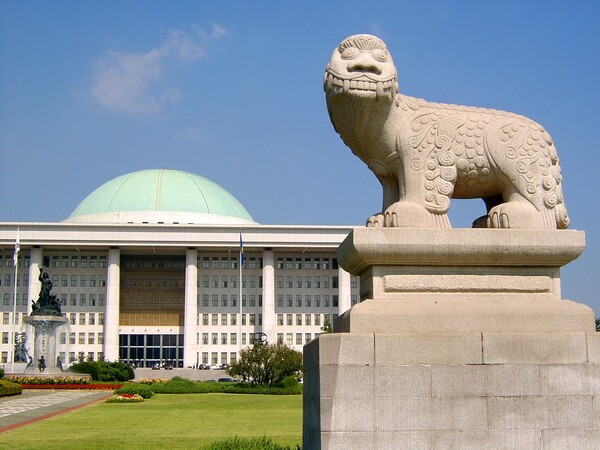
A press conference by “ADOR” CEO Min Hee-jin in which she made arguments against “Hybe Entertainment” stirred Korea. Coincidentally, this event occurred simultaneously with a summit between President Yoon Suk-yeol and the opposition party leader on April 29th, 2024. Despite its political significance as it marks President Yoon’s first meeting with the leader of the first opposition party (The Minjoo Party of Korea) since his inauguration, the summit garnered considerably less public interest than ADOR’s press conference. According to “Naver Data Lab,” search terms related to Min Hee-jin represented 43% of total queries on April 29th, while those concerning Yoon’s summit only accounted for 7%. Notably, among different age groups, Min Hee-jin’s name accounted for 35% of searches, with the summit at 13% among the 40-50s generation. For those in their 20-30s, the disparity was even more pronounced: 40% for Min Hee-jin and just 4% for the summit. This data suggests a marked level of political disengagement among the 20-30s generation compared to others. This article explores the reasons behind this political indifference in young adults and discusses why their engagement matters.
Political indifference grows among the youth in Korea
One indicator that identifies political interest is the voting turnout rate. On April 10th, 2024, a parliamentary election was held. The turnout in the general election was the highest since 1992 when there was a turnout of 72%, and up 0.8%p from the 21st National Assembly election. In terms of the number of early voters and turnout by age group announced by the National Election Commission, a total of 13,849,043 people did early voting, and those in their 50s and 60s cast the highest proportion with 22.7% and 22.5%, respectively. The turnout rate for those in their 20s and 30s was the lowest, recording 11.3% and 12.9%, respectively. This shows that young people’s political interest is remarkably low. The Dongguk Post surveyed the 20-30s who study or work at Dongguk University to examine whether the 20-30s are politically indifferent and, if so, the reasons for their indifference. 81.9% of students responded that the 20-30s had a low political interest. Throughout this result, it could be seen that the 20-30s recognize that their generation has a low political interest.
Reasons behind political indifference
Our survey presented three typical reasons for political indifference in the 20-30s. First, due to a sense of helplessness and frustration with society. Those who responded said the 20-30s have been disappointed by the situation where the pledges promised by politicians did not work. In addition, daily situations that are not handled properly accumulate, eventually, making them skeptical about society and feel like there is no point in having an interest in politics.
Second, it is due to the hardships of daily life. People in their 20-30s mostly have just started economic activities or are preparing for employment. The 20-30s generation is struggling to survive through the competitive modern society, providing no time for them to pay attention to every political change.
Third, it is said that politics are not interesting and feel difficult. People are well aware of the caricatures related to politicians but have difficulty understanding actual political content, such as major policies. Furthermore, political opinions are diverse in society. One does not easily know what is right, and these difficulties eventually lead to political indifference. Among the respondents who answered that it was not interesting, some indicated that sports news and entertainment news rather than politics felt more engaging. They also expressed that being well-versed in politics was not necessarily a significant issue.
In summary, the frustration regarding helplessness, a busy personal life, and the complexity of politics were seen as the main reasons behind the 20-30 generation’s political indifference.
Why should the youth pay attention to politics?
The necessity of political interest can be explained by the example of an election. The simplest way to show political interest is voting. Through voting, citizens can support the politicians who represent their opinions. If the 20-30s influence the results of the elections, politicians will listen to the 20-30s opinion to win votes. If the 20-30s are politically indifferent and do not vote, politicians will focus on other factors that give priority to their election status. People may say they do not vote because there is no suitable candidate to vote for. Even in this case, it is desirable to mark an abstaining vote at the polling place. Abstaining from voting suggests that there are no appropriate candidates to vote for. Then, politicians will present new policies to make abstaining votes a vote in their support. However, if they do not vote, this action will be interpreted as someone who will not also vote in the future. They will be classified as someone with no influence. Other than voting, we must pay political attention daily to form opinions and counter social issues. Thus, political attention is essential to live in a just and desirable society.
In Korea, the turnout of the 20-30s generation and their political interest increased compared to the 2010s. Nevertheless, the political participation rate of the 20-30s generation is still low. Political indifference occurs in the 20-30s due to the frustration and helplessness experienced by members of society, the current hard daily life, and the perception that politics is a boring or difficult topic. However, the youth must recognize that society does not change as rapidly as expected. If the 20-30s continue to pay attention to politics, their previous social helplessness and frustration can gradually ease and be resolved. In addition, the busy and difficult daily lives of the 20-30s will also stabilize, even if not completely resolved. The Dongguk Post hopes the 20-30s, including Donggukians, will take more active political interest than they do now.

